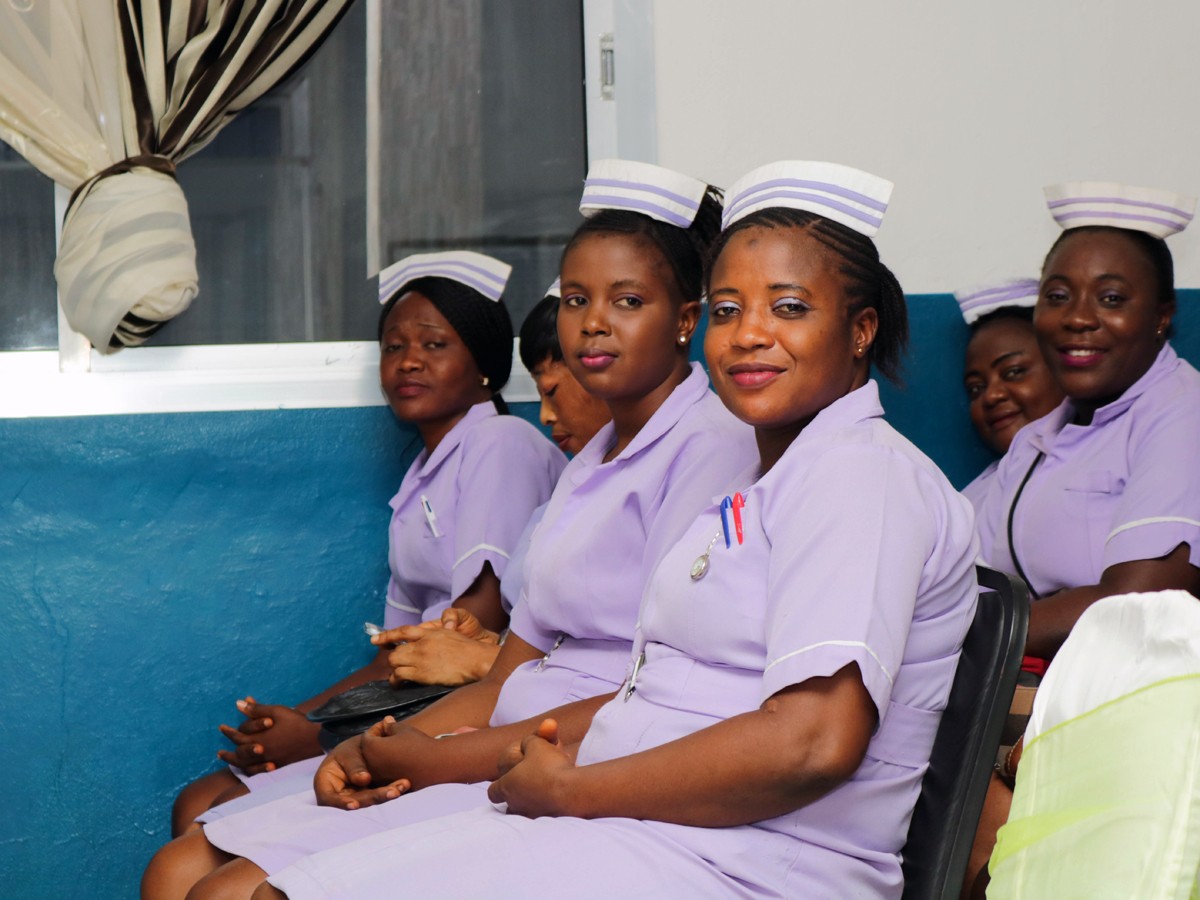(article originally published on PoliticoSL.com)
By Kemo Cham
Makeni midwifery school gets new skills lab
The School of Midwifery Makeni (SOMM) has received a major boost towards skills based education and training, with the inauguration of a new skills lab, library and computer lab.
The state of the earth facility was constructed with the support of the United States government, through its Health Resources & Services Administration (HRSA) and the U.S. President’s Emergency Plan (PEPFAR). The project, funded under HRSA’s Resilient and Responsive Health Systems (RRHS) initiative, entailed renovations, procurement and installation of equipment, training, policy development, and integration of skills-based learning into the midwifery curriculum.
Midwives, otherwise known as Skilled-Birth Attendants, are professionally trained to assist women in childbirth. They are trained to recognize the variations of normal progress of labor, and understand how to deal with deviations from normal.
Sierra Leone has the highest rates of maternal mortality globally, at 1, 195/100, 000, according to figures from the Ministry of Health. It also ranks among countries with the highest rates of infant mortality at 157/1000. Health ministry officials and experts say this is largely as a result of a range of implementation challenges including the critical shortage of health workers and the skills required to manage obstetric and newborn care.
According to the 2013 Demographic Health Survey, 3000 midwives were needed to ensure adequate care during pregnancy and birth in the country. Before the 2014 Ebola epidemic, the country had less than 100 trained midwives. The epidemic claimed many lives of healthcare providers, among them midwives.
The School of Midwifery Makeni (SOMM) was established in 2010 as part of efforts to increase the chances of access to midwifery education, amidst much demand for the services.
SOMM, accredited by the Sierra Leone Nurses and Midwives Board, was the second national midwifery school, after the School of Midwifery in Freetown, which has been in existence since 1945, and had been unable to meet the increasing demand for midwives in the country. In 2017, the third national school of midwifery was opened in the southern Bo district.
Since its inception in 2010, SOMM has enrolled 712 Students and graduated 467 midwives who were deployed by MoHS to various districts. Currently 97 students are awaiting graduation by May 2019.
The School trains State Certified Midwives (SCM), which is a two (2) year upgrading program of State Enrolled Community Health Nurses (SECHN) to SCM. It also trains obstetric nurses (SRNs and SECHNs) from St. John of God-Faith based nursing training school for a period of 3 to 5 months, on basic obstetrics and Midwifery, which are critical component of their curriculum.
In addition to the basic theoretical instruction received in the classroom, students receive clinical instructions in the clinical lab and practice settings in maternity units.
The new skills lab was designed to provide simulation-based education and training to complement other, more traditional forms of training. The US Mission’s Public Affairs Department said the facility will provide the advantage of teaching and assessing competence in management of rare yet life threatening events such as post-partum hemorrhage, pre-eclampsia, and birth asphyxia.
“Through simulation, students are able to become adept at clinical service delivery in a safe and supportive environment,” the statement says.
Health is one of the top priorities in the US Government’s engagement in Sierra Leone. HRSA in 2017 became the seventh U.S. government agency to join the U.S. Mission in the country.
The other agencies include the Centers for Disease Control and Prevention (CDC) which, like the HRSA is part of the U.S. Department of Health & Human Services, and USAID. Majority of the programs they are involved in are health related.
USAID is notably funding efforts to capacitate the country to detect, prevent and respond to infectious disease outbreaks under the global One Health initiative.
The RRHS is a 5-year, US$ 9.5 million grant which includes a heavy emphasis on achieving improved maternal health and HIV outcomes through strengthened midwifery education. The prime recipient of the RRHS grant is ICAP at Columbia University.
U.S. Ambassador Maria E. Brewer inaugurated the new facilities in Makeni in the second week of April. She was accompanied to Makeni by Minister of Health and Sanitation, Dr. Alpha T. Wurie. Also in Makeni to witness the inauguration ceremony were George Tidwell, Country Office Director for HRSA, and Dr. Susan Michaels-Strasser, Principal Investigator, ICAP at Columbia University.
In May 2018, a similar facility was commissioned by Ms Brewer at the National School of Midwifery (NSM) in Freetown. Politico understands that another facility is expected to be established at the Faculty of Nursing in the College of Medicine and Allied Health Sciences.
Photo courtesy of ICAP at Columbia University. Caption: Students at the School of Midwifery Makeni (SOMM) attend the commissioning event for the new skills labs on April 12, 2019.







